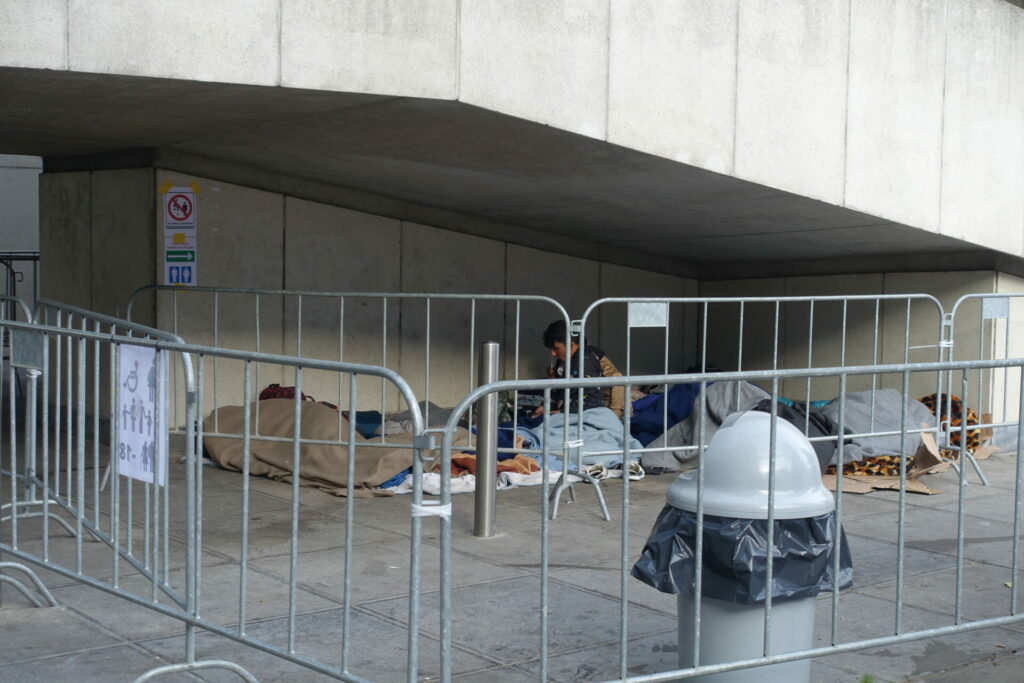Belgium's failure to shelter asylum seekers has resulted in many sleeping rough. To add salt to the wounds, some 50 asylum seekers spending the night outside the Immigration Department were robbed of the only belongings they had during clean-up operations.
Vluchtelingenwerk Vlaanderen (Refugee Council Flanders) and the support collective for asylum seekers Friendship without Borders have denounced Thursday's clean-up operations at the Immigration Department (DVZ) on Boulevard Pacheco in Brussels, where some 50 asylum seekers were sleeping rough due to failures of the Belgian State.
"Yesterday afternoon, an external firm, at the behest of the building owner [Belfius Insurance], came to collect all the belongings of the people sleeping at Pacheco. This means that these people have lost their sleeping gear and their backpacks. That backpack is often the only thing they have," said Thomas Willekens of Vluchtelingenwerk Vlaanderen.
Tweet translation: "These are two photos taken on the same day. These people come here to sleep every day because the Federal Government does not provide them with shelter. Every day they have to gather their belongings together, to avoid them being binned."
Their belongings, also including mattresses, pallets and bags, were reportedly taken by a small truck or van by three employees of an external company and thrown away on Thursday afternoon.
Riet Dhont of support collective Friendship Without Border told Belga News Agency that the vehicle passed by three times to pick up belongings. "The different floors, the ramp to go upstairs, and all the corridors above have been emptied." The loss for the asylum seekers who slept there is huge, "all their clothes and documents are gone".
When the clean-up operation was ongoing, most of the asylum seekers who owned the belongings were at the Humanitarian Hub, where they can get medical help, legal counselling, a shower or a meal. They usually stay there until dinner at 18:00, then they head back to the Immigration Offices. "They then saw that everything is gone," Dhont said on Thursday night.
'Situation cannot continue'
Paulien Blondeel, spokesperson at DVZ said that the clean-up operations followed meetings about the situation at the building.
"We were involved in that, but also Interparking, the Buildings Authority and the owner himself, but we have not been asking to throw stuff away. There was just an agreement that the situation could not continue as it is now," she said.
Meanwhile, Belfius' spokesperson Ulrike Pommée noted that the situation is a "particularly regrettable matter from a humanitarian point of view", but argued that clearing the passageway is at the same time a necessary step to ensure the safety of the passers-by, tenants, visitors, customers who pass there every day.
The company argued that there was an increased fire risk and a sense of insecurity due to the accumulation of rubbish. "The situation had got out of hand in recent weeks. The various parties therefore decided together to intervene. "But it was never the intention to take away the personal items," said Pommée. "Should this have happened, we will do everything possible to recover them to the extent possible."
Related News
- 'In incredibly bad shape': Belgium no closer to solving asylum reception crisis
- Brussels urged to get undocumented homeless people off the street
- Migration deal: Physically in Albania, legally in Italy
It is not the first time this month that such actions have taken place at the Immigration Offices. A small tent camp was broken up by police in early November "without providing humane alternatives". Meanwhile, last week the police demolished around a dozen tents at the Humanitarian Hub.
Willekens stressed that such incidents are the result of the government doing too little to avoid situations like this. "The bottom line is that the reception crisis is still not solved. Driving people out and taking away property is not the right solution." NGOs are still calling for the dispersal plan, provided for in national law that would see every municipality having to provide shelter to a certain number of people.

